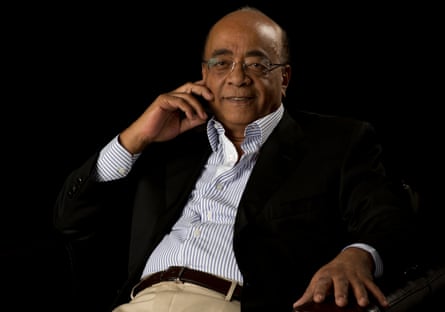The global rise of populism and “strongmen” has led to an increase in authoritarianism in Africa that is holding back progress in governance, the businessman and philanthropist Mo Ibrahim has said.
According to the latest edition of the Ibrahim index of African governance, 78% of Africa’s citizens live in a country where security and democracy deteriorated between 2014 and 2023.
“Africa is not disconnected from what’s going on around the world and you can see the global order is breaking down everywhere,” Ibrahim told the Guardian. “You can see many people breaching international law with impunity.”
“I think the moral threshold is coming down, unfortunately, globally, and that applies to us in this part of the world. Look how many ‘strongmen’ we have around the world. Now it’s been normalised.”

The report said the result had been a stalling of progress in governance across Africa, with effects on health and education, though the results were not uniform across the continent, with half the countries experiencing deteriorating overall governance and the other half seeing progress.
The study, which is published every two years, measures the performance of African governments in the fields of security and law; participation, rights and inclusion; economic opportunity; and human development, which includes health and education.
While the worst deterioration in the measures studied was in security and safety, democracy, including participation, rights and transparency, also deteriorated.
A large part of this deterioration was due to crackdowns on freedom of assembly – with people in 29 countries having “substantially” less freedom to come together and share ideas – as well as on civil society and freedom of speech, especially in digital spaces.
In the sub-category of security and safety, more than half the continent’s population saw violence increase over the last five years. The lack of security was slowing progress for economic opportunity as well as in health, education, social protections and sustainability.
The report highlighted 11 countries “on a concerning decade-long trend of deterioration”, including Sudan – where the continuing conflict has caused what the UN described as “one of the worst humanitarian nightmares in recent history” – as well as the Democratic Republic of Congo, and the Sahel region.
Decade-long deteriorations were also seen in high-ranked countries. Mauritius (in second place), Botswana (fifth), Namibia (sixth), and Tunisia (ninth), though still ranking in 2023 among the 10 highest-scoring countries, also featured among the most deteriorated countries from 2014 to 2023.
However, the report also highlighted rapid progress in overall governance by countries such as Seychelles, which now tops the index, Morocco, Ivory Coast, Benin and Angola.
The report also said there was strong progress in infrastructure – thanks to the spread of mobile communications, internet and energy access – as well as women’s equality, with better laws protecting women from violence, and better perception and representation of women in politics and leadership.
Despite signs of progress in many countries, the public perception of how well governments are performing has dropped, especially in relation to economic opportunities, security and poverty.
Ibrahim said this could be due to heightened expectations and also greater access to information from other parts of the world.
“This is a problem, because if the perception keeps going down, this means people are getting more and more dissatisfied … That generates stress in society and that leads to conflicts and other things,” said Ibrahim.
Source: theguardian.com


